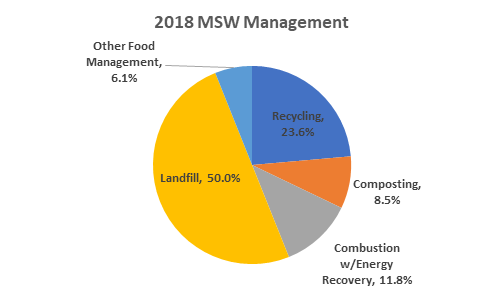Advocacy
December 3, 2020
US Recycling Goal Announced
US Environmental Protection Agency (EPA) Administrator Andrew Wheeler announced a voluntary US national recycling goal of 50 percent by 2030 during the 2020 America Recycles: Summit on November 17 in Washington, D.C. This goal will be complemented by other metrics to gauge contamination reduction, materials processing efficiency, and market strength for recycled materials. The selected metrics that were also announced are:
- Contamination Rate - The percentage of materials in the recycling stream that negatively impacts recyclability
- Processing Yield - The percentage of materials recovered by a materials recovery facility or another processing facility compared to the materials the facility receives
- Commodity Value - The average price of a ton of recycled materials
By April 2021, EPA intends to develop standards for calculating these measures and establish baselines. This will also be when the National Recycling Strategy will be finalized. SWANA previously submitted comments to EPA on the proposed metrics for the goals with input from the Core Advocacy Group and Recycling Task Force.
2018 US MSW Facts & Figures Report Released
On Friday, November 13, EPA released the most recent Advancing Sustainable Materials Management: Facts and Figures data on national municipal solid waste (MSW) and construction and demolition debris for the year 2018. The new data revealed a 32.1% recycling and composting rate, down from 35.2 percent in 2017. Recycling alone decreased to 23.6 percent, down from 24.9 percent. Slightly more material was recycled in 2018, but generation outpaced it, leading to a decrease in the overall percentage. This is the first year of data that reflects China’s imposition of National Sword, which may have contributed to the decline.

292.4 million tons of MSW were generated in 2018 compared to 268 million tons in 2017. EPA states that MSW generation rose considerably from 2017 to 2018 primarily because of enhancements made to its food measurement methodology to more fully account for all the ways wasted food is managed throughout the food system. The 2018 data includes 17.7 million tons of food that were managed by other methods that were not included in previous year data.
There were 146.2 million tons of MSW landfilled in 2018, increasing from 139.6 million tons in 2017. MSW combusted with energy recovery also increased from 34 to 34.6 million tons.
US & Canada Sign Plastics Trade Arrangement
The governments of the United States and Canada recently signed an arrangement to continue the trade of scrap and recyclables between the two countries. This preserves bilateral trade between them even after new international restrictions on plastic scrap go into effect in 2021.
Members of the Basel Convention on the Control of Transboundary Movements of Hazardous Wastes and their Disposal previously approved new regulation of the import and export of plastic scrap between member countries, requiring prior informed consent before the material can move. Canada is a party to the Basel Convention, but the United States is not. According to the Basel Convention amendment, member countries are not be allowed to trade in plastics with non-member countries, unless a separate agreement is reached. This new arrangement between the US and Canada will allow trade of plastic scrap to continue uninterrupted. It also covers all hon-hazardous materials, so that future amendments to the Basel Convention will not halt trade either. In 2019, the US exported 662,567 mt of plastics to Canada and imported 116,735 mt.
The SWANA Core Advocacy Group and Recycling Task Force were notified of this potential arrangement this summer after the Canadian government initiated an inquiry with the United States. SWANA was invited by both the Canadian government and US State Department to provide input on this arrangement.
Exporters of plastic scrap and recyclables in the US can expect reduced international trade options in January 2021, as many of the other 187 Basel Convention countries implement the new requirement.
China Ban on “Solid Waste” Imports Begins January 1
The Chinese government has again affirmed that it will stop importing all “solid waste” at the beginning of 2021. Despite restrictions on plastic and mixed paper that went into effect in 2018, China has been a major importer of other materials, particularly recovered fiber. This ban will include those remaining recyclables and scrap that were still being taken. Several major shipping companies already stopped accepting these materials for transport to China earlier this year in anticipation of the ban. China will continue to take “mill ready” materials, such as recycled paper pulp or plastic pellets.






